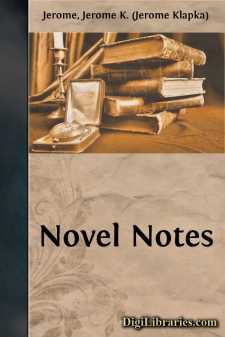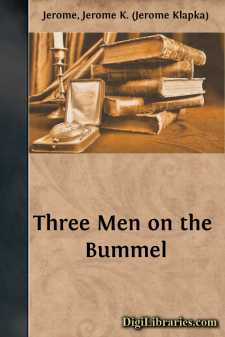Categories
- Antiques & Collectibles 13
- Architecture 36
- Art 48
- Bibles 22
- Biography & Autobiography 815
- Body, Mind & Spirit 144
- Business & Economics 28
- Children's Books 18
- Children's Fiction 14
- Computers 4
- Cooking 94
- Crafts & Hobbies 4
- Drama 346
- Education 58
- Family & Relationships 59
- Fiction 11835
- Games 19
- Gardening 17
- Health & Fitness 34
- History 1378
- House & Home 1
- Humor 147
- Juvenile Fiction 1873
- Juvenile Nonfiction 202
- Language Arts & Disciplines 89
- Law 16
- Literary Collections 686
- Literary Criticism 179
- Mathematics 13
- Medical 41
- Music 40
- Nature 180
- Non-Classifiable 1768
- Performing Arts 7
- Periodicals 1453
- Philosophy 65
- Photography 2
- Poetry 896
- Political Science 203
- Psychology 44
- Reference 154
- Religion 515
- Science 126
- Self-Help 85
- Social Science 83
- Sports & Recreation 34
- Study Aids 3
- Technology & Engineering 59
- Transportation 23
- Travel 463
- True Crime 29
Jerome K. (Jerome Klapka) Jerome
Jerome Klapka Jerome was an English writer and humorist best known for his comic travelogue "Three Men in a Boat," published in 1889. His works often feature light-hearted and witty observations on everyday life and human nature, which made him popular during the late Victorian and Edwardian eras. Jerome also wrote plays, essays, and other novels, contributing significantly to English humor literature.
Author's Books:
Sort by:
PROLOGUE Years ago, when I was very small, we lived in a great house in a long, straight, brown-coloured street, in the east end of London. It was a noisy, crowded street in the daytime; but a silent, lonesome street at night, when the gas-lights, few and far between, partook of the character of lighthouses rather than of illuminants, and the tramp, tramp of the policeman on his long beat seemed to...
more...
CHAPTER I Three men need change—Anecdote showing evil result of deception—Moral cowardice of George—Harris has ideas—Yarn of the Ancient Mariner and the Inexperienced Yachtsman—A hearty crew—Danger of sailing when the wind is off the land—Impossibility of sailing when the wind is off the sea—The argumentativeness of Ethelbertha—The dampness of the river—Harris suggests a bicycle...
more...
REGINALD BLAKE, FINANCIER AND CAD The advantage of literature over life is that its characters are clearly defined, and act consistently. Nature, always inartistic, takes pleasure in creating the impossible. Reginald Blake was as typical a specimen of the well-bred cad as one could hope to find between Piccadilly Circus and Hyde Park Corner. Vicious without passion, and possessing brain without...
more...
THE LOVE OF ULRICH NEBENDAHL Perhaps of all, it troubled most the Herr Pfarrer. Was he not the father of the village? And as such did it not fall to him to see his children marry well and suitably? marry in any case. It was the duty of every worthy citizen to keep alive throughout the ages the sacred hearth fire, to rear up sturdy lads and honest lassies that would serve God, and the Fatherland. A true...
more...
"Kindness," argued little Mrs. Pennycoop, "costs nothing." "And, speaking generally, my dear, is valued precisely at cost price," retorted Mr. Pennycoop, who, as an auctioneer of twenty years' experience, had enjoyed much opportunity of testing the attitude of the public towards sentiment. "I don't care what you say, George," persisted his wife; "he may be...
more...
Myself, I do not believe this story. Six persons are persuaded of its truth; and the hope of these six is to convince themselves it was an hallucination. Their difficulty is there are six of them. Each one alone perceives clearly that it never could have been. Unfortunately, they are close friends, and cannot get away from one another; and when they meet and look into each other's eyes the thing...
more...
CHAPTER I PAUL, ARRIVED IN A STRANGE LAND, LEARNS MANY THINGS, AND GOES TO MEET THE MAN IN GREY. Fate intended me for a singularly fortunate man. Properly, I ought to have been born in June, which being, as is well known, the luckiest month in all the year for such events, should, by thoughtful parents, be more generally selected. How it was I came to be born in May, which is, on the other hand, of all...
more...
PREFACE Said a friend of mine to me some months ago: “Well now, why don’t you write a sensible book? I should like to see you make people think.” “Do you believe it can be done, then?” I asked. “Well, try,” he replied. Accordingly, I have tried. This is a sensible book. I want you to understand that. This is a book to improve your mind. In this book I tell you all about...
more...
“Come in!” said Peter Hope. Peter Hope was tall and thin, clean-shaven but for a pair of side whiskers close-cropped and terminating just below the ear, with hair of the kind referred to by sympathetic barbers as “getting a little thin on the top, sir,” but arranged with economy, that everywhere is poverty’s true helpmate. About Mr. Peter Hope’s linen, which was white though somewhat...
more...
THE HERO. His name is George, generally speaking. "Call me George!" he says to the heroine. She calls him George (in a very low voice, because she is so young and timid). Then he is happy. The stage hero never has any work to do. He is always hanging about and getting into trouble. His chief aim in life is to be accused of crimes he has never committed, and if he can muddle things up with a...
more...











